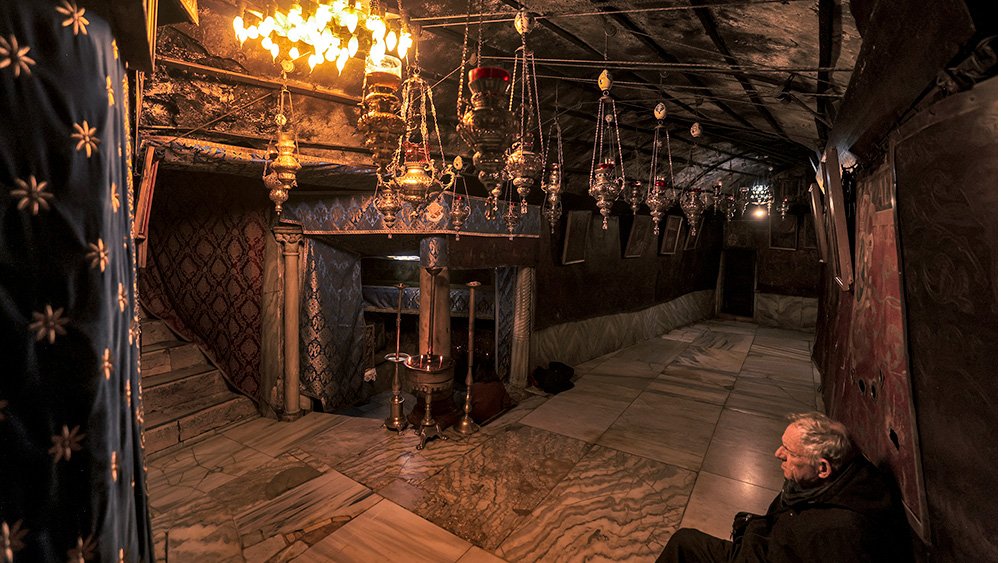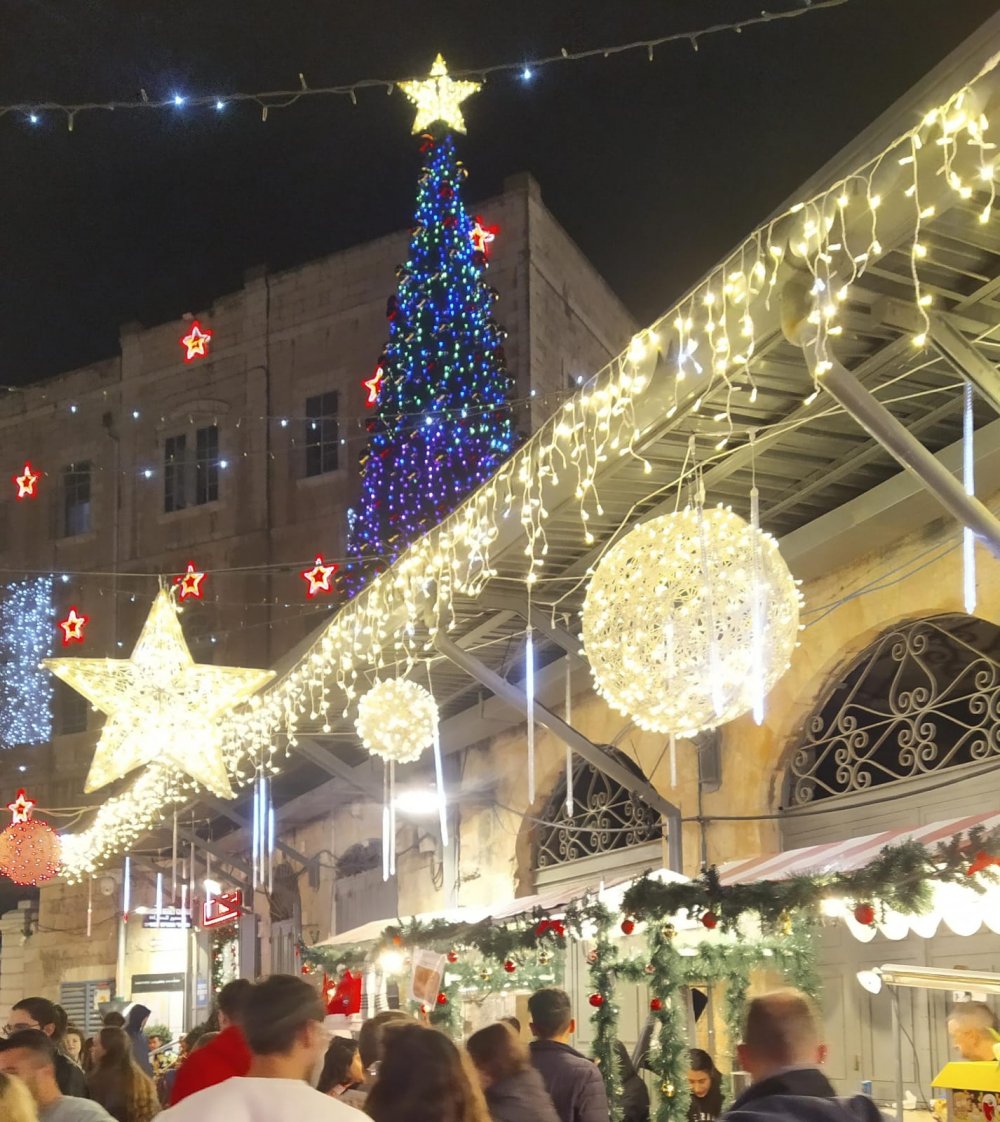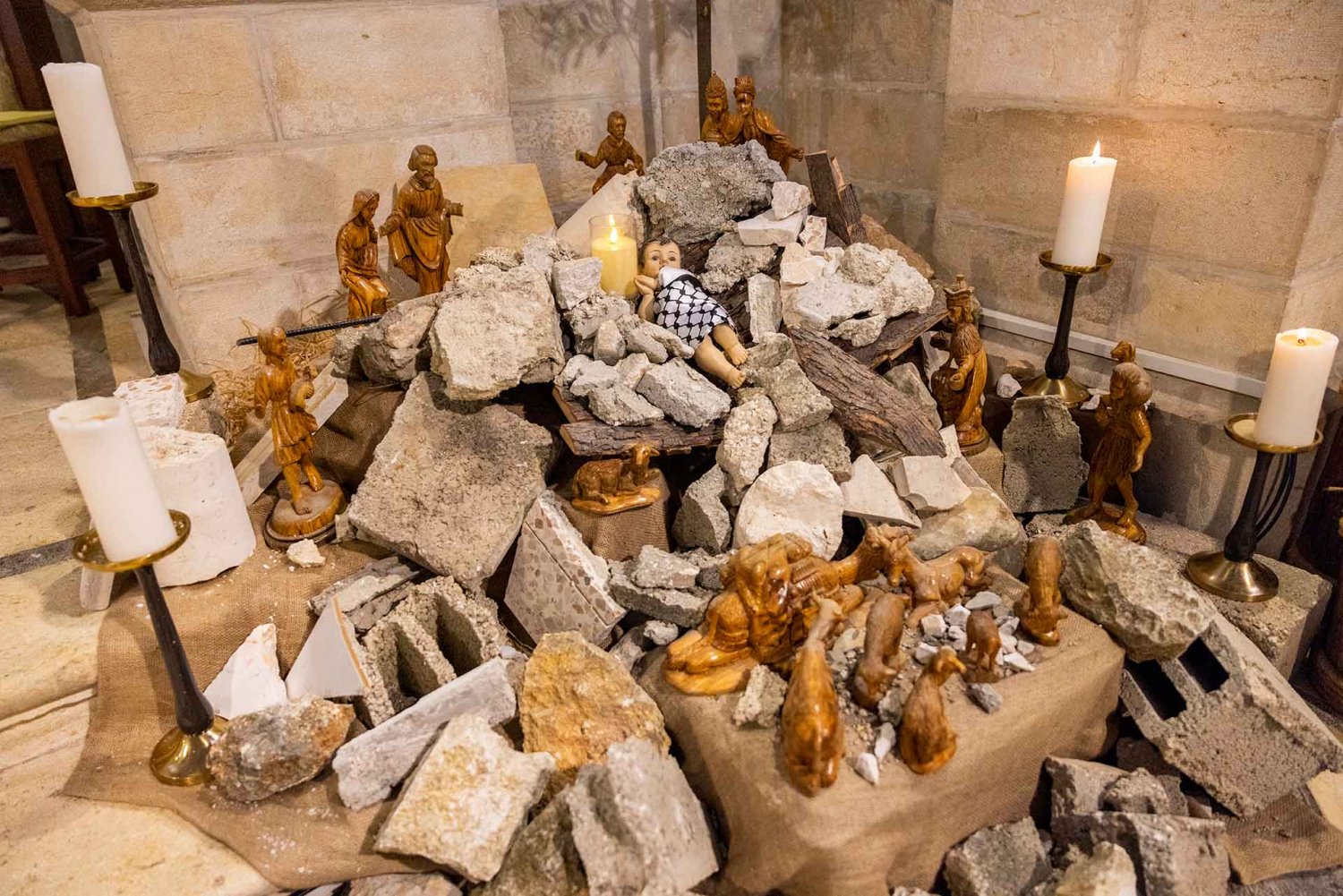“Merry Christmas, but don’t celebrate.” Bethlehem, the city of Jesus’ birth, announced that it was taking the rare step of canceling Christmas festivities across all churches in the city, prompted by Israel’s genocidal war on Gaza, where tens of thousands of Palestinians have been confirmed dead and double that number presumed dead under the rubble in over 70 days of Israeli bombardment. Palestinian Christian communities and leaders from across the country, including Jerusalem, expressed the same notion: Celebrating during this time isn’t the right thing to do.

Credit:
Hazem BaderAFP via Getty Images
“Ma fi Nifs”: Palestinians Have No Heart for Christmas Celebrations While Gaza Is Being Destroyed
Snapshot
From afar, a community mourns.
No Christmas Festivities in Bethlehem
Palestinian Christians, who belong to various Christian denominations, celebrate Christmas on one of three days: those who belong to the Western (Latin) churches on December 25; the Orthodox churches on January 7; and the Armenian churches on January 8 (the only community in the world to do so).
Christmas festivities in Bethlehem are normally eagerly anticipated, beginning in early December. Usually, a large, brightly lit Christmas tree is set up in Manger Square; a Christmas parade with musicians and their instruments winds through the Old City’s labyrinthine walkways; and Santas are stationed on street corners doling out sweets to children. In recent years, the adjacent Christian communities in Beit Sahur, Beit Jala, Ramallah, and other towns and cities have held their own festivities.
In Jerusalem, the Christmas tree is placed near the New Gate in the Old City, with a ceremonial lighting that normally draws large, jubilant crowds.
This year, however, is different. While churches will hold Christmas services, there will be no public festivities in Palestinian churches—or in Jordan, for that matter, as was announced by the Jordan Evangelical Council.
“Ma fi nifs”: No Heart for Celebrations
“For all the Christians in the world, as you are decorating your surroundings, streets, and towns, the people of Gaza are being killed,”1 affirmed Atallah Hanna, Greek Orthodox Archbishop of Sebastia in Occupied al-Quds. “The bombs are falling on them; they [the people] are being annihilated. There is blood, misery, and grief. When you eat and drink, think of the innocent people in Gaza who are dying of famine and shortage of water.” It’s the duty of the Christian world, he added, to consider what is happening in the place where Christmas itself began: the land of Palestine, which contains the nativity spot that all Christians are called to consider during these dire times.2
In an earlier meeting in December with a group of Jerusalemite Christian community members, Bishop Hanna observed that no one is in the mood to celebrate; as he put it, “ma fi nifs,” “There’s no spirit; no heart to celebrate when people are being shelled, bombed, traumatized, and thirsting for life.”3 The audience nodded in agreement.
This sentiment was expressed by many people on social media as well as in casual conversation. Despite what often seemed like progress in the last few decades on certain fronts, such as technology and movements promoting equality, 2023 was a difficult year for Palestinians: Day in and day out throughout the country, ordinary people have been hounded, attacked, ethnically cleansed, and bombarded en masse by the Israeli army and settlers, leaving many dead and displaced.
Reverend Dr. Munther Isaac, director of Christ at the Checkpoint and senior pastor at the Evangelical Lutheran Christmas Church in Bethlehem, observed that the United States “feels free to veto a proposed UN resolution for a ceasefire; it celebrates Christmas in [its] land, and wages war in our land.”4
Baby Jesus under the Rubble
Rev. Dr. Isaac has been making headlines for displaying a very different Christmas manger at the Evangelical Lutheran Christmas Church in Bethlehem this year: Baby Jesus lying amid the rubble.
“If Jesus were born today, he would be born in Gaza under the rubble,”5 Isaac noted, a reference to the ongoing Israeli bombardment of Gaza that has claimed so many children. In his sermon on December 7, he explained, “Maybe some people were surprised by the nativity scene in our church this year. I realize this is a difficult idea. But believe me, this is precisely the meaning of Christmas.” He added, "As death, destruction, and rubble crush in Palestine, this is how we welcome the King of Glory. If Jesus were to be born into our world today, I wonder, would he have entered our world in any other way?”6 This captures the sentiments of Jerusalemites this year.
Asked whether Christmas festivities had ever been “canceled” in this way, prominent theologian and founder and president of Dar al-Kalima University Rev. Dr. Mitri Raheb noted that Christmas was canceled the year of the First Intifada and again the year of the Second Intifada.7 In his view, “canceling Christmas” is the “least we can do from where we are” in light of the atrocities. Christians are native to this land, “not imported from the West . . . Christmas started in Bethlehem, Palestine, and not in Bethlehem, Pennsylvania.”8 He has written about the Christians of Palestine; the Christians in Gaza belong to the oldest Christian community in the world, going back to the first century.
Solidarity with Gaza through Other Christmas Observances
Adele Zumot, a Christian Palestinian from Jerusalem who is known for her voice as a radio presenter at Yabous Radio Station, recently informed listeners that she “does not have the heart to celebrate”9 and that she will not put up a Christmas tree in her house this year. Others will try to combine the Christmas spirit with awareness-raising about the situation at large.
For example, Sabeel, Ecumenical Liberation Theology Center prepared to observe Christmas (on December 23) by having a theater performance titled “Emmanuel” at the Notre Dame of Jerusalem Center. “Amid the rubble of pain, hope is birthed,” the promotional poster reads. Sabeel’s director, Omar Haramy, describes the production as one highlighting war and displacement through a story of birth.10 Inspired by the Christmas story of the “newborn King,” the play is set in Palestine as it is today.
At the Young Women’s Christian Association (YWCA) in East Jerusalem, in mid-December, St. Barbara’s Day—a festival celebrated by Christians in Palestine, Jordan, Lebanon, and Turkey—Christmas was observed through reflection. Sandrine Amer, executive director of the YWCA of Jerusalem, mentioned that the YWCA sustained this long-time tradition, and the decision was made to maintain the breakfast and burbara sweets (wheat berry pudding made from barley and sugar, with additions such as cinnamon, raisins, and ground anise) through reflection on Saturday, December 16. “Christmas is a time of joy, but it’s also a time of remembrance of suffering and oppression. This is quite relevant today,” Amer noted.11 “After all, thousands of years ago, Herod [King of Judea] had ordered the execution of children in the Massacre of the Innocents around this time of year. Meanwhile, on December 17 [in the third century], Saint Barbara, a Christian convert in the Palestinian village of ‘Abud, is said to have been killed by her father for holding onto her faith, and the story of her resilience to persecution has been passed on through generations.”
Reflecting on the resilience of Palestinian religious figures offers a glimpse of hope during a dark and mournful time.
Notes
‘Atallah Hanna, “It is the duty of the Christian world, he added, to consider what is happening in the place where Christmas itself began” [in Arabic] Facebook, December 17, 2023.
Hanna, “Christian world.”
Meeting with Christian community members at the Armenian Seminary in Jerusalem, attended by the Jerusalem Story Team on December 8, 2023.
Munther Isaac (@MuntherIsaac), “I was asked today by a journalist,” X, December 10, 2023, 12:51 p.m.
Munther Isaac (@MuntherIsaac), “Explaining our Christmas manger on the rubble” [in Arabic] X, December 7, 2023, 6:01 p.m.
Isaac, “Explaining our Christmas.”
Mitri Raheb, interview by the Jerusalem Story Team, December 19, 2023.
“Palestinians Cancel Christmas Celebrations: Rev. Mitri Raheb’s Insight,” Muslim Network TV, December 15, 2023.
Daoud Kuttab, “Palestinian Christians in Jerusalem Face Somber Christmas Season in Gaza’s Long, Dark Shadow,” Jerusalem Story, December 21, 2023.
Omar Haramy, interview by the Jerusalem Story Team, December 19, 2023.
Sandrine Amer, interview by the Jerusalem Story Team, December 20, 2023.


